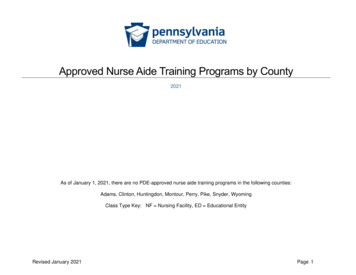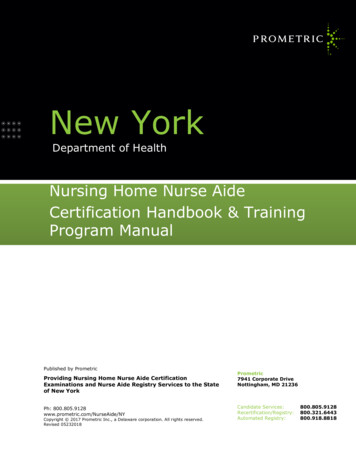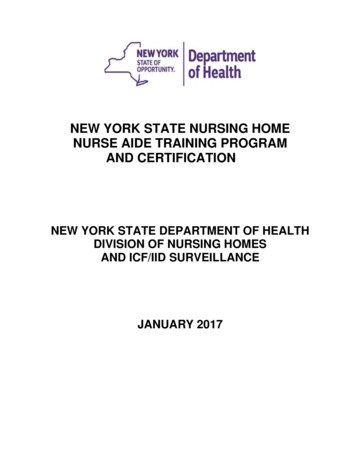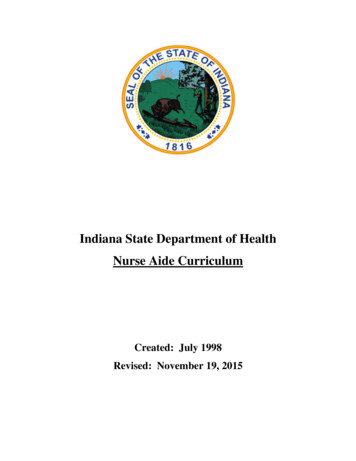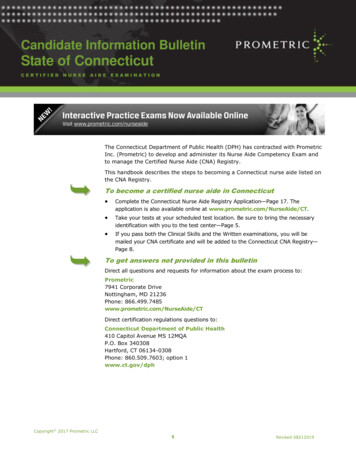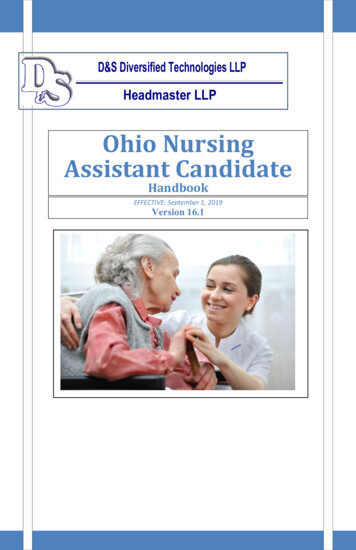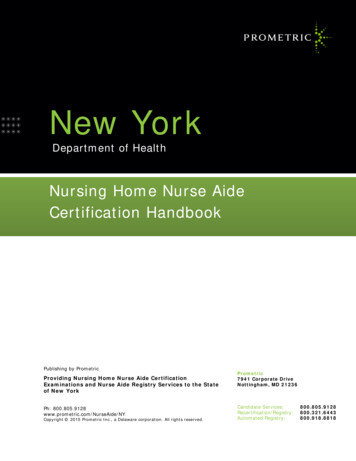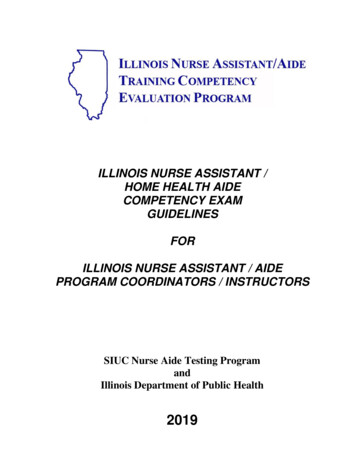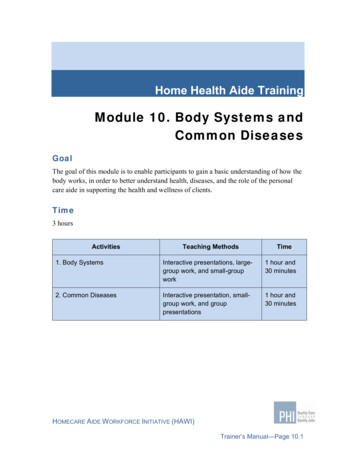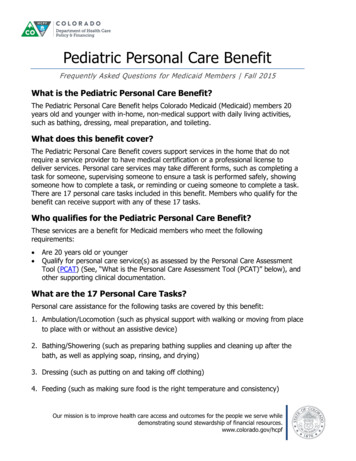
Transcription
Personal Care AideTraining RequirementsSummary of State FindingsCompiled by Abby Marquand, PHI Policy Research AnalystMarch 2013Funding for the “50-State PCA Training Project” provided by the Center for Personal Assistance Services at the University of California, SanFrancisco (National Institute on Disability and Rehabilitation Research, Grant No. H133B080002), the Centers on Medicare and Medicaid Services,The SCAN Foundation, and the Ford Foundation.
PCA Training RequirementsFederal MinimumTraining Standardsfor Direct-CareWorkersCertified Nurse Aide: 75hours (16 supervised clinical)(42 CFR 484.36)The Institute of Medicinerecommends at least 120hours of CNA training,but only 13 states and theDistrict of Columbia meetthis standard. In 20 states,the requirements have notchanged for over 20 years.Home Health Aide/HospiceAide: 75 hours (16 supervisedclinical) (42 CFR 484.36)The Institute of Medicinerecommends at least 120hours but only 5 states meetthis standard. Only 15 statesexceed the federal minimumstandard.Personal Care Aide: NoStandards2Summary of State FindingsIntroductionPersonal care aides (PCAs) provide essential supports and services thatenable older adults and individuals with disabilities to reside safely intheir homes and participate in their communities. They are known bymany job titles, including personal assistants, direct support professionals, and in-home care providers. According to the Bureau of LaborStatistics, collectively these workers constitute the fastest-growingoccupation in the nation.A large proportion of the personal care workforce serves consumers in state Medicaid programs — Medicaid State Plan Personal CareOptions, Medicaid Home and Community-Based Services (HCBS)waiver programs, and under Medicaid 1115 Demonstration waiverprograms. However, unlike other direct-care occupations, particularlycertified nursing aides and home health aides, there are no federal training standards for PCAs who work under publicly funded programs.Consequently, training standards for PCAs, where they exist at all, varyby state and by program, potentially leading to significant differences inthe level of preparedness of these workers across the country—and evenwithin states.The PHI 50-State PCA Training Project has collected comprehensiveinformation about PCA training standards in Medicaid programs acrossthe country. Following a brief summary of our national findings, thisreport presents our findings on training standards in each state and theDistrict of Columbia.MethodsTraining requirements for PCAs were examined in all 50 states andD.C., with searches limited to personal assistance services offered underMedicaid State Plans and HCBS waiver programs for elders and individuals with physical, intellectual, and/or developmental disabilities.Systematic searches were conducted of relevant state administrativecode (including departmental regulations and licensing laws both forbusinesses and individuals), Medicaid provider manuals, and MedicaidWaiver documents.We developed two conceptual frameworks or “lenses” for assessingand cataloguing the state standards we identified:
3PCA Training RequirementsLens 1: Training ElementsFigure 1: Training elements continuumNoneTraining ummary of State FindingsHoursCurriculumExamThe first lens allows us to examinethe required components of eachstate’s training standards in order toassess the rigor and depth of theserequirements. For example, do thesestandards specify skills or competencies for aides? Must aides complete aminimum number of training hours? Isthere a standard curriculum, a competency exam, or a certification process?One can visualize these elementsarrayed on a continuum of least to most stringent, with programs having no requirements for PCAs on one end, and those requiring certification on the other (see Figure 1). Identifiable elements lying betweenthese two extremes include: CPR/First Aid requirements, agency-basedrequirements, state-specified training hours, state-specified skills andcompetencies, state-sponsored curricula, and exams or competencyevaluations.Lens 2: Training UniformityWe also examined PCA training requirements in terms of their uniformityacross each state’s personal assistance programs. This lens allows us tounderstand how “rational” a state’s system is—meaning how universalthe PCA training requirements are across programs and populations.In theory, more uniform requirements would enable PCAs who dosimilar work to move between programs and across populations providing services and supports to people with similar functional limitations.Disparate requirements between programs within a state, by contrast,may lead to large differences in the level of qualification of aides withina state, or may make certain training redundant for PCAs who wish toswitch jobs.Figure 2: Training uniformity continuumWithin a state, are there ?Requirementsfor someprogramsNo trainingrequirementsRequirementsacross allprogramsUniformrequirementsacross allprogramsWe measure uniformity by considering standards relating to four trainingelements: specified training hours,specified skills/competencies, stateendorsed curriculum, and a requiredexam or competency evaluation. Wethen group states into four broadcategories:1. S tates that have no trainingrequirements for any programs2. S tates that have requirements, butonly for some programs
PCA Training Requirements4Summary of State Findings3. S tates that have requirements for all programs, but not uniformrequirements4. A nd states that have uniform requirements for PCAs across allprogramsFigure 2 displays an example of the resulting schematic.It should be noted that “uniformity” is not inherently superior tovariation in training standards within a state. For example, a statethat has strong requirements for PCAs in one large program (e.g., acompetency-based 40-hour training curriculum), but not others, may onnet have a stronger training foundation than a state with uniform butweak requirements across all programs.Key findingsWithout federal standards, states have implemented an assortment ofPCA training requirements in publicly funded programs providinglong-term services and supports. However, few states have well-definedtraining standards for PCAs providing services in these programs, anda significant percentage have no standards at all. Furthermore, whileover 40 percent of states have “uniform” requirements across their PCAprograms, the vast majority of these standards are very weak.Our specific findings using the two lenses we developed — on rigorand uniformity— are detailed below:Training Elements Findings – Lens 1Using the Training Elements Continuum, which assesses the depth andrigor of state training standards, we found that in one or more personalassistance programs (excluding participant-directed programs): 23 states (45 percent) have no training requirements of any kind. 2 7 states (53 percent) leave the sufficiency of PCA training to theagency-employer. 2 5 states (49 percent) specify required training hours for PCAs;however, of these, 14 (27 percent) require no more than 40 hours ofentry-level training. pproximately a quarter of states have a state-sponsored PCA Acurriculum and/or require certification.Training Uniformity Findings – Lens 2Using the Training Uniformity Continuum to assess the extent to whichtraining requirements are aligned across programs within a given state,we found that (excluding participant-directed programs): 1 0 states (20 percent) have no training requirements for PCAs inany of their programs.
5PCA Training RequirementsSummary of State Findings 1 2 states (24 percent) have training requirements in only some oftheir PCA programs. 7 states (14 percent) have training requirements for PCAs in all oftheir programs, but these are not uniform across programs. hile 22 states (43 percent) have uniform training requirements Wfor PCAs across all programs, only 5 of these specify detailed skillsand a curriculum for PCAs. Additionally, 4 of the 22 states requirePCAs to complete home health aide training. The remaining stateshave far lower standards.Findings for Participant-Directed ServicesA growing number of PCAs are employed directly by program participants (or beneficiaries) within public programs, and not solely byagency providers.We found that: 1 3 states (26 percent) specified training for participant-directedPCAs in some or all of their participant-directed programs. Ofthese, 4 require the same training for both agency-directed andparticipant-directed attendants. 2 7 states (53 percent) leave training to the discretion of theparticipant. 1 1 states (22 percent) make no mention of training for participantdirected PCAs.In short, the vast majority of states either leave training up to theprogram participant or do not address training for participant-directedaides.For more information on the PHI 50-State PCA Training Project, ining-requirements or contactAbby Marquand at amarquand@phinational.org.
6PCA Training RequirementsSummary of State FindingsState SummariesWhile states have many different titles for direct-care workers providingpersonal assistance services, for the sake of consistency and in keeping with theformal occupational title given by the U.S. Department of Labor, we refer tothese workers as “personal care aides” throughout the following summaries.AlabamaAlabama offers personal assistance services through four MedicaidHCBS waivers: the Mental Retardation (MR) Waiver, the State ofAlabama Independent Living Waiver (SAIL), the Living at Home (LAH)Waiver, and the Elderly and Disabled (ED) Waiver. The MR Waiver, SAILWaiver and the LAH Waiver programs do not specify training for PCAsbut allow for specialized training at the discretion of the participant. TheED Waiver program requires PCAs to be trained in specific topics, suchas basic infection control, prior to providing services, but the method fortraining is left to the provider agency. Participant-directed services areavailable under the Personal Choices program, which serves clients whoreceive services under the SAIL and ED waivers. The training of theseparticipant-directed PCAs is left to the discretion of the participant.AlaskaAlaska offers personal assistance services through the Medicaid StatePlan. Agency-employed PCAs must complete an Alaska Medicaidapproved 40-hour (16 clinical) competency-based training and evaluation within four months of the start of employment. Aside from trainingin CPR and First Aid, training for PCAs employed in the participantdirected program is conducted at the discretion of the participant.ArizonaArizona provides personal assistance services through the ArizonaLong Term Care System (ALTCS), under the state’s Medicaid 1115Waiver. PCAs providing attendant and personal care are required tocomplete an Arizona Medicaid-approved training and testing program.For this training, the state provides a model curriculum, “Principles ofCaregiving,” or requires that PCAs be trained in a curriculum based onthe same core competencies. PCAs providing Self-Directed AttendantCare (SDAC) and independently registered PCAs are exempt from thesetraining and testing requirements. For these aides, the state requirestraining in CPR and First Aid, universal precautions, and confidentialitywith additional training at the discretion of the participant.
7PCA Training RequirementsSummary of State FindingsArkansasArkansas offers personal assistance services through the Medicaid StatePlan as well as one Medicaid HCBS waiver: the Alternatives for Adultswith Physical Disabilities HCBS Waiver. As outlined in agency licensingstandards, agency-employed PCAs must complete 40 hours of trainingwith a state-approved curriculum and a competency evaluation in orderto be certified. No training requirements are specified for participantdirected PCAs.CaliforniaCalifornia offers personal assistance services under the Medicaid StatePlan and two Medicaid HCBS waivers: the In-Home Operations Waiverand the Multipurpose Senior Services Program. Neither the MedicaidState Plan nor the waiver programs require training for agencyemployed aides. Participant-directed services are available under theIn-Home Supportive Services (IHSS) Program. In this program trainingis at the discretion of the participant and can be facilitated by thecounty-based public authorities. Additionally, California is one of sixstates awarded a three-year grant by the federal government to developa training and credentialing program for PCAs, as part of the Personaland Home Care Aide State Training (PHCAST) Program, a provision ofthe Affordable Care Act of 2010.ColoradoColorado offers personal assistance services under two Medicaid HCBSwaivers: the HCBS Waiver for Persons who are Elderly, Blind, andDisabled and the Supported Living Services Waiver. In the HCBS Waiverfor Persons who are Elderly, Blind, and Disabled, agency-employedPCAs are required to have a minimum of 20 hours of training or pass anagency-administered skills validation test. Broad skills for the trainingare outlined by the state, but the agency is responsible for ensuring thattheir employees meet the requirement. Under the Supported LivingServices Waiver, training for agency-employed PCAs is not specified;however, aides must be competent in providing the necessary tasks. Theparticipant is responsible for training the PCA under the participantdirected options in both waiver programs.
8PCA Training RequirementsSummary of State FindingsConnecticutConnecticut delivers personal assistance services through four MedicaidHCBS waivers: the Home Care Program for Elders, the Personal CareAssistance Waiver, the Individual and Family Supports Waiver, andthe Comprehensive Supports Waiver. Participant-directed optionsare available under each of these waiver programs. Neither agencyemployed PCAs nor participant-directed PCAs have specific trainingrequirements, but both types of workers must demonstrate competencyin general areas outlined by the state. Generally, agencies or participantsmust ensure that PCAs are competent. Fiscal intermediaries will assistparticipants in providing training for their workers.DelawareDelaware offers personal assistance services through one MedicaidHCBS waiver: the Elderly and Disabled Waiver. The state outlines theskills for PCAs, but the provider agencies are responsible for ensuringcompetency through their own training and evaluation programs.District of ColumbiaThe District of Columbia provides personal assistance services underthe Medicaid State Plan and two Medicaid HCBS waivers: the HCBSWaiver for Mental Retardation and Developmental Disabilities andthe HCBS Waiver for the Elderly and Disabled. PCAs serving clients inthese programs are required to be certified as home health aides and,therefore, must complete 125 hours of training and pass a competencyevaluation. The District of Columbia does not offer participant-directedservices under its Medicaid program.FloridaFlorida provides personal assistance services under the Medicaid StatePlan as well as under four Medicaid HCBS waivers: the Aged andDisabled Adult Waiver, the Channeling for the Frail Elderly Waiver, theAlzheimer’s Waiver, and the Developmental Disabilities (DD) Waiver.In all but the DD Waiver, PCA services must be delivered by a certifiedhome health agency that employs direct-care providers who meet homehealth aide training standards. Independent providers are permittedto provide these services as well if they (a) have one year of experience providing services in either a medical setting or for a programfor individuals with developmental disabilities or (b) have completedcollege, vocational, or technical training in medical, psychiatric, nursing,child care, or developmental disabilities. The post-secondary educationmust be equal to 30 semester hours, 45 quarter hours, or 720 classroomhours. The DD Waiver requires that both agency-employed PCAs andindependent PCAs complete online training modules facilitated by theAgency for Persons with Disabilities.
9PCA Training RequirementsSummary of State FindingsGeorgiaGeorgia offers personal assistance services through four Medicaid HCBSwaivers: the Independent Care Waiver Program, the Community CareServices Waiver Program (CCSP), the New Options Waiver Program(NOW), and the Comprehensive Supports Waiver Program (COMP). AllPCAs employed by agencies are required to complete at least 40 hoursof agency-provided training in broad areas outlined by the state. Aidesproviding participant-directed services in the COMP Waiver must becertified direct support professionals. Certification follows completionof a 12-hour course using the College of Direct Support curriculum orequivalent training.HawaiiHawaii provides personal assistance services under a Medicaid 1115Waiver program, a managed long-term care plan called Quest ExpandedAccess (QExA) (expanded from the Medicaid managed-care program,MedQuest), as well as through a Medicaid HCBS waiver for personswith developmental disabilities and intellectual disabilities (DD/ID).The state specifies that providers of personal assistance services mustbe trained in several broad areas, but leaves the training to the provideragencies. The managed long-term care waiver offers personal assistanceservices through two managed-care organizations (MCOs), Evercareand ‘Ohana. The MCOs are responsible for determining contractingstandards for the provider agencies, or enforcing their own requirementsfor PCAs. For example, Evercare provides orientation for PCAs indisease management and other topics —training that is also mandatoryfor participant-directed PCAs. Participant-directed services are availableunder the managed-care and DD/ID waiver programs. Under the latter,training is at the discretion of the participant.IdahoIdaho provides personal assistance services through the Medicaid StatePlan and two Medicaid HCBS waivers: the Aged and Disabled Waiverand the Developmental Disabilities Waiver. All PCAs must be successfully trained in specific competencies set forth in the “Idaho SkillsMatrix.” The matrix lists required competencies and the person or entityresponsible for verification. PCAs must pass a written examination anddemonstrate competency in each listed task. Each employer determinesthe methods used to train and assess PCA competencies. In the case ofparticipant-directed services, which are offered under the waivers, thefiscal intermediary oversees training in communication, confidentiality,and patient rights. Any additional training for participant-directed PCAsis provided at the discretion of the participant.
10PCA Training RequirementsSummary of State FindingsIllinoisIllinois offers personal assistance services through two Medicaid HCBSwaivers: the Waiver for Adults with Developmental Disabilities and theWaiver for Persons with Disabilities. Under the Waiver for Adults withDevelopmental Disabilities, agency-employed PCAs must completestate-approved direct support personnel training and a competencybased assessment, and be certified as Illinois direct support professionals. The training curriculum mandates 40 hours of classroom trainingand 80 hours of on-the-job training. Participant-directed servicesare offered under this waiver as well as the Waiver for Persons withDisabilities. Training for participant-directed PCAs is left to the discretion of the participant.IndianaIndiana provides personal assistance services under two MedicaidHCBS waivers: the Developmental Disabilities (DD) Waiver and theAging and Disabled Waiver. For the DD Waiver program, agencyemployed PCAs are trained by their employer. The agency must document that attendants are trained in several broad areas. The Aging andDisabled Waiver program offers both agency and participant-directedservices, but specifies no training requirements for PCAs deliveringeither type of service.IowaIowa offers personal assistance services through three Medicaid HCBSwaivers: the HCBS Waiver for Persons with a Physical Disability, theHCBS Elderly Waiver, and the HCBS Intellectual Disabilities Waiver.Each waiver offers a participant-directed option. Currently, there are noformal training requirements for PCAs in Iowa. However, personal careaides must demonstrate proficiency through documentation of priortraining or experience. For participant-directed services, training is atthe discretion of the participant.Iowa is one of six states awarded a three-year grant by the federalgovernment to develop a training and credentialing program for PCAs,as part of the Personal and Home Care Aide State Training (PHCAST)Program, a provision of the Affordable Care Act of 2010. The IowaDepartment of Public Health has implemented a pilot training andcredentialing system for PCAs intended to result in a standardizedcore training across programs and a career ladder based on specializedadvanced modules. The pilot program ends in September 2013, withstatewide implementation to follow.
11PCA Training RequirementsSummary of State FindingsKansasKansas delivers personal assistance services through three MedicaidHCBS waivers: HCBS for the Frail and Elderly, the Physical DisabilityWaiver, and the HCBS MR/DD Waiver. Each waiver offers a participantdirected option. There are no formal training requirements outlinedby the state for agency-employed or participant-directed providers. Atmost, PCAs are required to have “general knowledge of the necessarytasks.” For participant-directed services, training is left to the discretionof the participant.KentuckyKentucky provides personal assistance services under three HCBSMedicaid waivers: the Home and Community Based Services Waiver,the Michelle P. Waiver (for individuals with intellectual and developmental disabilities), and the Supports for Community Living Waiver.Under the HCBS Waiver, PCAs must be employed by certified homehealth agencies, which means they must complete the state’s homehealth aide training and competency evaluation. The Michelle P. Waiverand Supports for Community Living Waiver provide only participantdirected services. Mandatory training in abuse, neglect, and exploitationis required for PCAs in these programs and the participant-directedprogram under the HCBS Waiver.LouisianaLouisiana offers personal assistance services through the MedicaidState Plan as well as two Medicaid HCBS waivers: the Elderly andDisabled Adult (EDA) Waiver and New Opportunity Waiver (NOW) forDevelopmentally Disabled. The Medicaid State Plan and NOW programoffer participant-directed services. Training requirements for agencybased and participant-directed PCAs are outlined within facility licensing standards, which require 16 hours of training in certain broad areas.The one exception is for participant-directed PCAs in the NOW programfor whom training is conducted at the discretion of the participant.
12PCA Training RequirementsSummary of State FindingsMaineMaine offers personal assistance services through the Medicaid StatePlan and three Medicaid HCBS waivers: the HCBS Waiver for Adultswith Intellectual Disabilities or Autistic Disorders, the HCBS Waiver forthe Elderly and Adults with Disabilities, and the HCBS Waiver for thePhysically Disabled. The Medicaid State Plan and the HCBS Waiver forElderly and Adults with Disabilities both require a minimum of50 hours of training for PCAs. The training follows a state-approvedcurriculum and PCAs must successfully complete a competency exam.The HCBS Waiver for Adults with Intellectual Disabilities or AutisticDisorders requires PCAs to complete a 45-hour training programfrom the College of Direct Support. For participant-directed servicesunder the Medicaid State Plan and the HCBS Waiver for the PhysicallyDisabled, training is at the discretion of the participant. Additionally,Maine was one of six states awarded a three-year grant by the federalgovernment to develop a training and credentialing program for PCAs,as part of the Personal and Home Care Aide State Training (PHCAST)Program, a provision of the Affordable Care Act of 2010.MarylandMaryland delivers personal assistance services through the MedicaidState Plan and four Medicaid HCBS waivers: the Living at Home WaiverProgram, the Older Adults Waiver, the Community Pathways Waiver,and the New Directions Independence Plus Waiver. All waivers exceptthe New Directions Waiver offer participant-directed services. PCAs providing services under the Medicaid State Plan, Living at Home Waiver,and Older Adults Waiver are required to receive training by an RN inthe provision of all services included in the recipient’s plan of care.The Community Pathways Waiver and New Directions IndependencePlus Waiver specify additional training for agency-employed aides —CPR, First Aid, and other broad skill areas —tied to licensing standardsfor agencies providing services to individuals with intellectual anddevelopmental disabilities. Training requirements for participantdirected PCAs are at the discretion of the participant, who can potentially waive all training requirements.
PCA Training Requirements13Summary of State FindingsMassachusettsMassachusetts delivers personal assistance services through theMedicaid State Plan and the Frail Elder Medicaid HCBS Waiver.In Massachusetts, PCAs are classified into four categories: Homemakers(Home Care Aide I), Personal Care Homemakers (Home Care Aide II),Home Health Aides (Home Care Aide III), and Supportive Home CareAides (Home Care Aide IV). Personal Care Attendants, not includedin the hierarchy, are either consumer-delegated (meaning someemployment functions are administered by the fiscal inter mediary)or participant-directed and receive training at the discretion of theparticipant. These services are provided through the MedicaidState Plan.Personal Care Homemakers and Supportive Home Care Aidesprovide services through the Frail Elder Medicaid HCBS Waiver.Personal care homemakers must complete at least 60 hours of training.While employer agencies can use their own curricula for this training,most use the state-endorsed curriculum and exam offered by the MACouncil for Home Care Aide Services. Individuals with dementiareceiving personal care services under the Frail Elder waiver are servedby Supportive Home Care Aides who have 75 hours of home healthaide training plus an additional 15-hour dementia-related training.Massachusetts was one of six states awarded a three-year grant bythe federal government to develop a training and credentialing programfor PCAs, as part of the Personal and Home Care Aide State Training(PHCAST) Program, a provision of the Affordable Care Act of 2010.
14PCA Training RequirementsSummary of State FindingsMichiganMichigan provides personal assistance services under the Medicaid StatePlan (Home Help Program) and two Medicaid HCBS waivers: the MIChoice Waiver and the MI Habilitation Supports Waiver. In the HomeHelp program, PCAs, whether agency-employed or participant-directed,must agree to participate in any necessary training; however, training is atthe discretion of the participant. The MI Choice Waiver recommends thataides delivering services to participants complete a certified nurse aidecourse; however, at a minimum, employer agencies must train each aideto properly perform the tasks required for each participant. Participantdirected PCAs in this waiver must have training in universal precautionsand blood-borne pathogens, with no other standards specified.Under the Habilitation Supports Waiver, competency of PCAs, eitheremployed by agencies or directly by participants, is overseen by PrepaidIn-patient Health Plans (PIHPs); these aides must be competent enoughto provide the services in a particular client’s plan of care but are notrequired by the state to complete any formal training. Consequently,each PIHP has established its own training requirements and mechanisms for delivering the training. Additionally, Michigan is one of sixstates awarded a three-year grant by the federal government to developa training and credentialing program for PCAs, as part of the Personaland Home Care Aide State Training (PHCAST) Program, a provision ofthe Affordable Care Act of 2010.MinnesotaMinnesota offers personal assistance services through the Medicaid StatePlan and four Medicaid HCBS Waivers: the Community AlternativeCare Waiver, the Elderly Waiver, the Developmental Disabilities Waiver,and the Community Alternative Disabled Individuals Waiver. In May2009, the governor of Minnesota signed into law comprehensive reformof Personal Care Services, which included the establishment of mandatory Department of Health Services-administered training for PCAs.This training and a competency test are available free online in sixlanguages for all agency-employed and independent PCAs. The onlinetraining covers the following topics: emergencies, infection controland standard precautions, body mechanics, understanding behaviors,boundaries and protection, timesheet documentation, fraud, and selfcare. Participant-directed PCAs receive additional participant-specifictraining at the discretion of the participant.
15PCA Training RequirementsSummary of State FindingsMississippiMississippi provides personal assistance services under two MedicaidHCBS waivers: the Independent Living Waiver and the IntellectualDisabilities/ Developmental Disabilities (IDD) Waiver. PCAs providingservices under the IDD waiver are required to complete a minimum of20 hours of training. The agency determines the training topics, whichmust be approved by the Department of Mental Health. Participantdirected PCAs providing services to clients under the IndependentLiving Waiver must receive training from an agency that is permitted bythe state to train certified nurse aides. The general content of the trainingis outlined by the state, and these PCAs must demonstrate
Personal Care Aide. Training Requirements. Summary of State Findings . Compiled by Abby Marquand, PHI Policy Research Analyst. March 2013. Funding for the “50-State PCA Training Project” provided by the Center for Per
